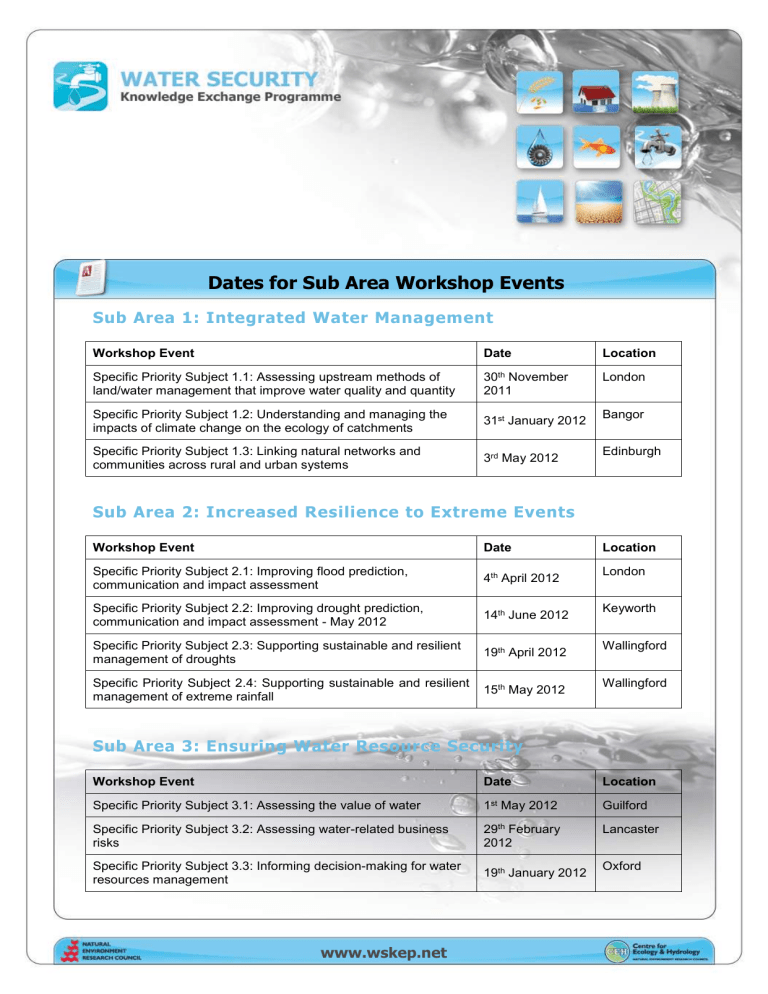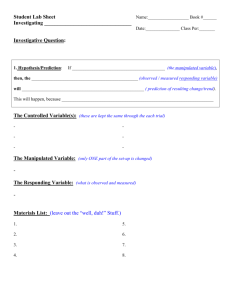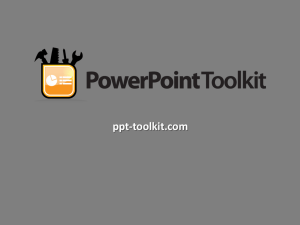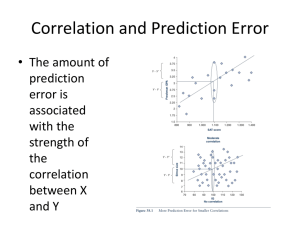Water Security Knowledge Exchange Programme events

Dates for Sub Area Workshop Events
Sub Area 1: Integrated Water Management
Workshop Event
Specific Priority Subject 1.1: Assessing upstream methods of land/water management that improve water quality and quantity
Specific Priority Subject 1.2: Understanding and managing the impacts of climate change on the ecology of catchments
Specific Priority Subject 1.3: Linking natural networks and communities across rural and urban systems
Date
30 th November
2011
Location
London
31 st January 2012
Bangor
3 rd May 2012
Sub Area 2: Increased Resilience to Extreme Events
Edinburgh
Location
London
Workshop Event
Specific Priority Subject 2.1: Improving flood prediction, communication and impact assessment
Date
4 th April 2012
Specific Priority Subject 2.2: Improving drought prediction, communication and impact assessment - May 2012
Specific Priority Subject 2.3: Supporting sustainable and resilient management of droughts
14 th June 2012
19 th April 2012
Specific Priority Subject 2.4: Supporting sustainable and resilient management of extreme rainfall
15 th May 2012
Sub Area 3: Ensuring Water Resource Security
Keyworth
Wallingford
Wallingford
Workshop Event
Specific Priority Subject 3.1: Assessing the value of water
Specific Priority Subject 3.2: Assessing water-related business risks
Specific Priority Subject 3.3: Informing decision-making for water resources management
Date
1 st May 2012
29 th February
2012
Location
Guilford
Lancaster
19 th January 2012
Oxford
www.wskep.net
WSKEP Information Document
Sub Area 1: Integrated Water Management
The sustainable management of water resources at different spatial scales. This priority area concentrates on integrating an understanding of ecosystems with land and water management techniques to improve the management of water resources encompassing both rural and urban areas.
Specific Priority Subject 1.1: Assessing Upstream methods of land/water management that improve water quality and quantity
The management of agricultural land influences the quality and quantity of water in rivers and streams. As such, the objective of gaining ‘good’ status under the WFD can potentially be achieved through changes in land management and land use. This is especially relevant with respect to controlling nutrient pollution. Are there land management schemes that can provide concurrent improvement in both water quantity and quality downstream? Can we identify which land management options have effective impacts on water quantity and quality?
Specific Priority Subject 1.2: Understanding and managing the impacts of climate change on the ecology of catchments
The ecology of waterbodies is crucial in determining their status within the WFD. Ecological status reflects water quantity and quality, both of which are likely to be impacted by future climate change through, for example, changing flow regime and macro-nutrient cycling. Climate change will be a key consideration in the next phase of River Basin Planning under the WFD. Is there a sufficient knowledge base available on which to base management options with a view to adaptation and mitigation? What is the implication of climate change on the WFD?
Specific Priority Subject 1.3: Linking natural networks and communities across rural and urban systems
Many major towns/cities lie on, or are at the mouth of, rivers and yet our understanding of the connectivity between the urban centre and the rural catchment is weak. Is there an opportunity to make more use of nature, through understanding ecosystem services, for sustainable water management rather than relying on
‘infrastructure’? Are there opportunities in understanding the importance of catchments as networks of interlinked communities?
Sub Area 2: Increased Resilience to Extreme Events
The prediction and mitigation of extreme events, with a focus on information management and coordination to increase resilience to events as they occur. This Sub Area will link with the LWEC Flooding Strategy which is currently being drafted.
Specific Priority Subject 2.1: Improving flood prediction, communication and impact assessment
Flooding leads to substantial costs to people and to the economy through impacts on a wide range of commercial sectors. There have been significant advances in flood risk estimation and in flood forecasting but flooding remains a prominent natural hazard. What work is now required to reduce uncertainties in flood prediction and risk assessment? Are the human and environmental impacts adequately understood?
Specific Priority Subject 2.2: Improving drought prediction, communication and impact assessment
Droughts tend to be regional in extent and so have widespread human health, environmental and commercial consequences. Although droughts build up slowly their prediction is difficult and uncertainties are large. What work is now required to reduce uncertainties in drought prediction and risk assessment? Are the human and environmental impacts adequately understood?
Specific Priority Subject 2.3: Supporting sustainable and resilient management of droughts
Even with improved prediction of droughts, managing these extreme events to minimise human and financial losses is a major challenge. Are there opportunities to make more use of water transfers?
Specific Priority Subject 2.4: Supporting sustainable and resilient management of extreme rainfall
Even with improved prediction of floods, managing these extreme events to minimise human and financial losses is a major challenge. Are there opportunities to make more use of ‘natural’ flood alleviation measures?
WSKEP Information Document
WSKEP Report
Sub Area 3: Ensuring Water Resource Security
Water security is focused on preventing a gap between supply and demand. The threat of population growth and climate change may make this problematic and it will be essential for businesses, investors, regulators and government agencies to understand their water-related vulnerability, and the value of water-related ecosystem services. Understanding these factors is vital to protect both the environment and our economy. It is important to develop more accurate data about the services that water provides and the risks that it poses, and to transform this data into practical tools for stakeholders to use.
Specific Priority Subject 3.1: Assessing the value of water
Water is essential to the function of the natural environment, to human life and to businesses. What are the options for establishing the ‘value’ of water to all sectors, especially to ecosystem services, such that appropriate allocation of the available water resource can be made in space and time?
Specific Priority Subject 3.2: Assessing water -related business risks
Business interests and sectors are impacted by current water related risks, notably droughts and floods.
Conversely, the water environment is impacted by the business and commercial sector through pollution and water abstraction. These risks are likely to change in the future as a result of climate change. Are the risks adequately known and quantified? Are we making the most of our data and models to explore future risk related scenarios?
Specific Priority Subject 3.3: Informing decision -making for water resources management
The management of the water environment and of water supply is a complex process undertaken and informed by a wide range of stakeholders. Are there opportunities to establish more ‘joined-up’ management approaches? Are appropriate models, tools and data available to inform the management process?
Review Events
Sub Area 1 Review: 21 st June 2012
Sub Area 2 Review: 26 th June 2012
Sub Area 3 Review: 12 th June 2012
Final Event for the Sub Areas
High Level Event: 11 th September 2012
For further information on these workshop events please contact:
Kay Heuser ( kaus@ceh.ac.uk
)
Water Security Knowledge Exchange Programme Coordinator
WSKEP_report_v1.0.doc 3 18/04/2012





